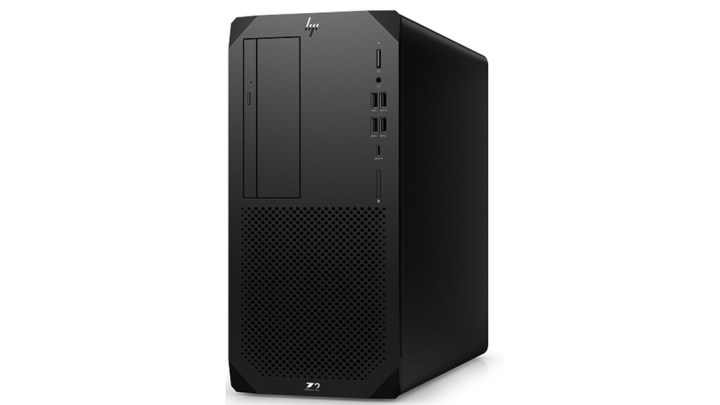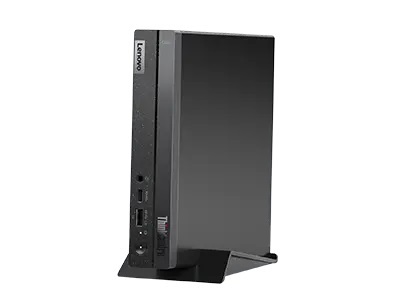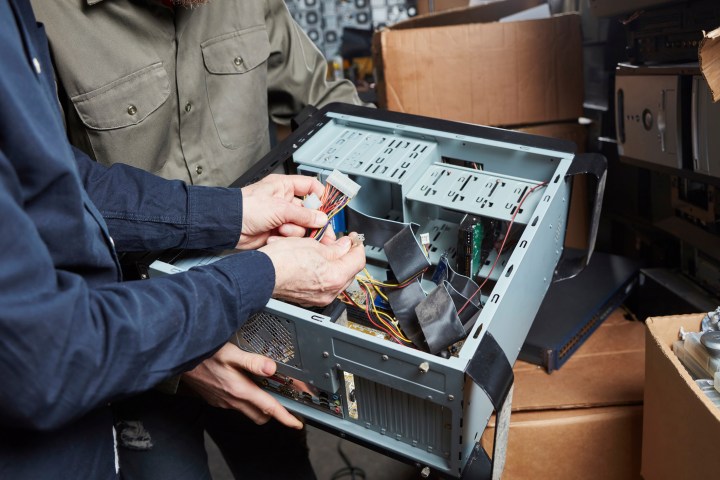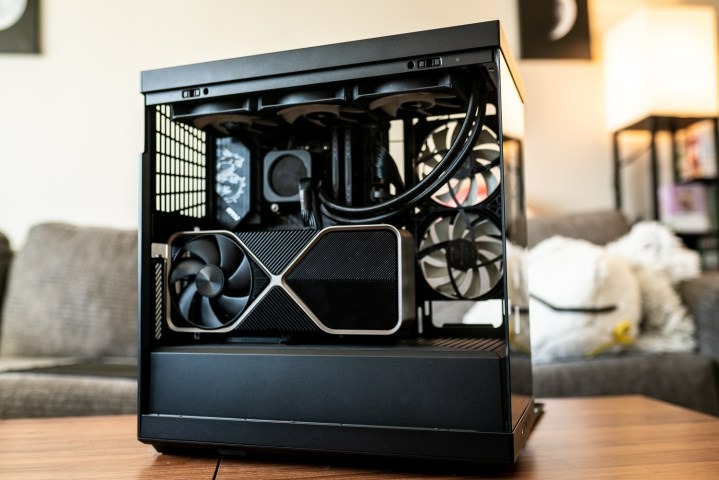
If you're shopping for a desktop Linux PC, you've probably noticed that your options are much more limited than if you were shopping for a Windows 11 desktop. Linux PCs aren't nearly as common as the rest of the competition, and trying to get Linux running on certain PCs can be an absolute slog. Because of this, it's important to find a rig that lets you load and launch Linux without any issues. Better yet, there are a handful of great desktop PCs that come with a Linux distro preinstalled – all you have to do is plug the unit in, and you're ready to go.
Finding these products can be a challenge, however, as they're buried beneath a sea of Windows 11 desktops. But if you need some help with the process, we've put together a short list of our favorite desktop Linux PCs to guide you in your search. Along with our best overall pick and premium pick, we've included a few Linux mini PCs, as they're surprisingly popular and highly customizable. Many of these products hail from popular brands like HP and Dell, so they're all but guaranteed to last for years before running into issues.
Without further ado, here's a look at the best desktop Linux PCs of 2024.

The best overall Linux desktop PC
HP Z2 G9 Tower Workstation
- Preloaded with Ubuntu
- Great CPU
- Tons of customization options
- Mediocre SSD
| Specifications | |
|---|---|
| CPU | Intel Core i5-12500 |
| RAM | 16GB |
| SSD | 256GB |
Clocking in at less than $1,000 and built to high standards, the HP Z2 G9 Tower Workstation is a great option for Linux. In fact, this model comes with Ubuntu preinstalled, though you'll also find an option that's "Linux Ready" or one that bundles in Windows 11.
Aside from Ubuntu, this is a typical, well-rounded desktop. It comes with an Intel Core i5-12500 Processor that hits up to 4.6GHz with Boost, along with 16GB RAM for smooth multitasking. If neither of those specs are good enough for your daily needs, you'll be glad to hear that the PC is totally customizable, allowing you to bump it up to a staggering 128GB RAM and the ultra-premium Intel Core i9-13900K if your heart desires (and your wallet can handle the increased cost).
The GPU isn't the most exciting (it's just an Intel UHD Graphics 770 card), and the 256GB SSD is adequate for this price. If you need more storage, you can add up to 4TB before purchase, though you might be better off just using external drives to save a bit of cash. But despite these shortcomings, the HP Z2 G9 Tower remains an excellent option for Linux.


The best budget Linux desktop PC
Lenovo ThinkCentre Neo 50q Gen 4 Thin
- Small footprint
- Great price
- Impressive specs for an affordable PC
- Not ideal for heavy workloads
| Specifications | |
|---|---|
| CPU | Intel Core i3-1215U |
| RAM | 8GB |
| SSD | 256GB |
At less than half the price of the Z2, the Lenovo ThinkCentre Neo 50q Gen 4 Thin is a good choice for frugal shoppers. It's not going to blow you away with its performance, but it puts up solid numbers while clocking in at under $500.
Its Intel Core i3-1215U processor isn't the most powerful, but its great for most of your daily computing needs – though folks looking to code demanding programs or dive into video editing will need to look elsewhere. But aside from that minor drawback, the specs on the Neo 50q are pretty solid. This includes 8GB RAM and a 256GB SSD, along with a tiny footprint that lets you place it in even the most cramped office.
This model comes with Ubuntu Linux preinstalled, so you won't have to worry about uninstalling Windows 11 and getting Ubuntu up and running. Just plug in the PC, load it up, and Ubuntu will be there waiting for you. If you're shopping on a budget, this is without a doubt one of your best options for Linux.


The best premium Linux desktop PC
Dell Precision 5860 Tower Workstation
- Top of the line CPU
- Highly customizable
- Dell reliability
- Expensive
- Excessive for most users
| Specifications | |
|---|---|
| CPU | Intel Xeon W5-2465X |
| RAM | 64GB |
| SSD | 1TB |
If money isn't a concern, you really can't do much better than the Dell Precision 5860 Tower Workstation. This Linux PC is an absolute beast, offering specs that put everything else on this list to shame. The downside? It costs over $6,000.
Still – if you're working with cutting edge software or diving deep into machine learning or intensive photo or video editing, this Linux PC is worth its weight in gold. Instead of the usual Intel Core lineup, this one uses the Intel Xeon W5-2465X, which is remarkably powerful and ideal for intense workloads. It's also rated for improved longevity, allowing you to push it to the limits day in and day out without worrying about it slowing down over the years. Coupled with an Nvidia RTX A4500 and 64GB RAM, there's little you can throw at the 5860 that it won't be able to handle.
Rounding out the ultra-premium Linux PC is a 1TB SSD and Ubuntu preinstalled. And if somehow all of that isn't enough, Dell lets you customize its configuration before purchase, with components such as GPU, CPU, SSD, and RAM eligible for a swap. There's even an option to swap out Ubuntu for Red Hat Linux Enterprise.


The best mini PC for Linux
Beelink U59 Pro
- Compact footprint
- Great price
- Decent power considering its size and price
- Not ideal for heavy workloads
| Specifications | |
|---|---|
| CPU | Intel N5105 |
| RAM | 16GB |
| SSD | 500GB |
Mini PCs are popular for Linux, and the Beelink U59 Pro is a great combination of pricing and performance. The big selling point is that Ubuntu comes preinstalled on the tiny PC, so you won't have to worry about getting it installed around Windows 11.
What might be most impressive about the U59 Pro, however, is how much it packs into such a small space and with such a small price tag. At just over $200, it's much cheaper than any other option on this list – even our favorite budget Linux PC! Yet despite the tiny price, you'll get 500GB SSD and 16GB RAM, which is quite impressive for such a small rig.
Other specs include an Intel N5105 processor, Intel HD Graphics 550, and a variety of ports to add all your accessories to the PC, including four USB ports, two HDMI ports, and an audio jack. Be sure to give it a closer look if you want an affordable PC that's also small enough to toss in a backpack or wedge onto a cramped desk.


The best premium mini PC for Linux
Beelink SER5 Pro
- Heaps of RAM
- Small footprint
- Several customization options
- Laptops still offer better portability
| Specifications | |
|---|---|
| CPU | AMD Ryzen 7 5700U |
| RAM | 32GB |
| SSD | 500GB |
If you like the idea of a mini PC but wish it had more power than the U59 Pro, then the SER5 Pro is a great alternative. It's quite a bit more expensive at over $400, but it still gets you some great specs at a reasonable price.
Before going any further, it's worth noting that this mini PC is not equipped with a Linux distro. Instead, it comes with Windows 11. However, most users shouldn't have too much trouble getting Linux up and running on the rig. If you need help with the process, be sure to check out our guide on how to install Ubuntu on a Windows computer.
Aside from that caveat, this mini PC is loaded with big features. For less than $500, this Beelink product gets you 32GB RAM, 500GB SSD, and a powerful AMD Ryzen 7 5700U processor. Beelink also notes that the SER5 Pro is ideal for running three screens at once, thanks to its multiple of ports and powerful internal components. A few different variants of this mini PC are available, including one that gets you a Ryzen 9 6900HX or a cheaper version with a Ryzen 5 5560U. So if you're turned away by some of the above specs, there's a good chance Beelink offers a model that works for your processing needs.


Build your own desktop PC for Linux
- Built exactly to your specifications
- Incredible customization options
- Cheap
- Time consuming
| Specifications | |
|---|---|
| CPU | N/A |
| RAM | N/A |
| SSD | N/A |
If you're using Linux, there's a good chance you like to tinker with PC components and push software to the limits. You might also like to get the most bang for your buck, as Linux distros are much better on your budget than expensive Windows software. In that case, you might be best off building your own desktop PC for Linux.
Building a desktop for Linux is similar to building a desktop PC for Windows. You'll need a bit of technical know-how, but the process itself is pretty easy – involving little more than connecting cables and turning a screwdriver. Of course, you'll need to make sure all your components play nicely together, but there are plenty of guides online to help you maneuver through the process. You can also consult our guide on how to build a PC if you need a few pointers.
What makes this a compelling option for Linux is that you can tailor your PC to your exact specifications. And since there aren't nearly as many prebuilt Linux PCs available as there are Windows PCs, this could be the best way to get a Linux desktop PC that fits your needs exactly. You'll also save money, as piecing together a CPU, GPU, RAM, SSD, motherboard, and other components is often cheaper than buying a prebuilt.

How we chose the best Linux desktop PCs
Windows dominates the PC marketplace, but that doesn't mean it's impossible to find a product that supports Linux. Many Windows PCs make it an absolute hassle to get Linux running properly – and unless you're a tech expert or are willing to sink hours into researching the process, your best bet is just buying one that comes with a Linux distro preinstalled. Beyond that, there are plenty of other factors to consider. Here's how we settled on the above list.
Supports Linux without any fuss
Above anything else, a Linux desktop PC needs to support Linux. Ideally, it comes preinstalled or is easy to sideload. Whether you want to run with Ubuntu or Mint, you shouldn't have any trouble getting your software up and running.
Powerful processor and RAM
Aside from supporting Linux, a good Linux desktop PC is essentially the same as a good Windows PC. That means you'll want a powerful processor and heaps of RAM so you can tackle all your tasks without any slowdown. Ideally, your rig will have one of the latest processors from Intel (ideally an i5, i7, or i9) and AMD (ryzen 5 or higher) along with at least 8GB RAM – and arguably much more depending on your needs.
Sizable SSD that's easily expanded
Storage is always a pinch point with PCs, especially if you're a gamer or deal with large files such as photos and videos. It's not uncommon to see Linux PCs with 1TB SSDs, though 512GB are also acceptable if they're easily expanded via ports for external drives or if there are open slots for additional SSDs. Alternatively, you can opt to use cloud storage, making internal storage less of an issue.
Customizable
Most PCs can be opened up and customized as you see fit. This makes it easy to keep your rig up to date without having to shell out for a whole new PC. Some products can even be customized prior to purchase, allowing you to tweak their processor, SSD, or RAM before throwing down cash. This makes it easy to find something that fits your needs. In other words, if you find a Linux PC that's almost perfect, be sure to look closer to see if the manufacturer lets you change its configuration before adding it to your cart. Many products on this list can be modified ahead of purchase, so you can tweak them to perfectly fit your workload. Some even let you choose which Linux distro you want to run.
Pricing
Let's face it – some PCs are overpriced for what they have to offer. When compiling this list, we made sure that each item posed a great value to consumers. That means you won't find any inflated price tags or frivolous features that aren't necessary for your daily tasks. Instead, this list is filled with popular models that carry reasonable price tags. Of course, some features are limited to premium rigs, but we made sure you're getting a fair price for everything packed into these Linux PCs.
Brand recognition and reliability
Opting for lesser-known brands can be risky, as many of these manufacturers have spotty quality records. And while a PC might look good on paper, it could be shoddily pieced together and prone to breakdowns. Because of this, we largely stuck with brands that have stood the test of time. Companies like Dell, HP, Lenovo, Acer, and more were all considered for this list, ensuring you get a rig that'll last a long time before any serious issues arise.
This article is managed and created separately from the Digital Trends Editorial team.



